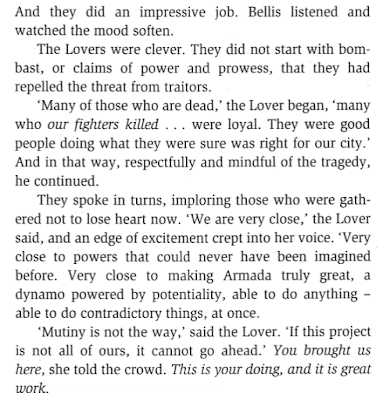The leaders of the city Armada are The Lovers, a couple (one male, one female) whose names we never learn. They're both simply referred to as The Lovers when they're talked about as a couple, or The Lover when they're referred to alone. The image below, of p.731 from my copy, is typical of the way they are described.
 |
| Image of p.731 of The Scar, with dialogue of each Lover speaking in turn. |
'Many of those who are dead,' the Lover began... and in that way... he continued.And then the female Lover speaks, which you can tell because of the female pronoun 'her':
'We are very close,' the Lover said, and an edge of excitement crept into her voice.The interesting thing about it is the way that Miéville doesn't make any distinction between the two Lovers' names beyond using the relevant pronouns where appropriate. The Lover is what we call an R-expression, or referring expression. It's a definite noun phrase and it works basically just like a name. Imagine that you had two people called Billie speaking in a dialogue. You'd differentiate between them by using maybe the initial of their surname, like 'Billie J began... Billie C responded...'. Or if you were talking about two girls chatting, you'd say 'The first girl said... the other girl replied...'.
These expressions include as part of their meaning the notion of uniqueness. Using the implies that there is only one of the thing you're referring to, or at least only one in the relevant context. So if there's more than one, like with the girls example, you have to add in something that makes each the only one (like the first girl), so that the two referring expressions refer to different things. In the Lovers example, there is just one referring expression and so it should refer to just one unique thing. But it doesn't; it refers to either of the two Lovers. Without making any concession by saying, for instance, the male Lover, Miéville flouts this expectation of uniqueness, creating a very unsettling effect.
No comments:
Post a Comment